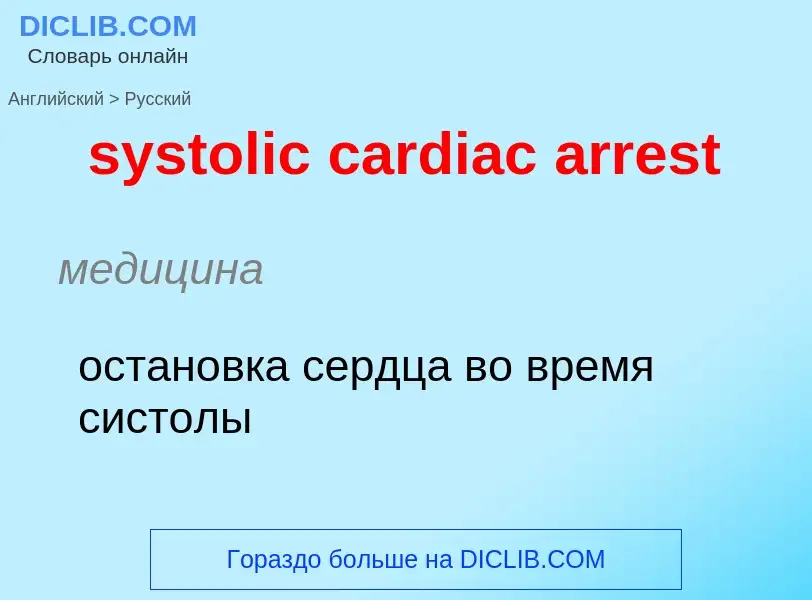Traduzione e analisi delle parole tramite l'intelligenza artificiale ChatGPT
In questa pagina puoi ottenere un'analisi dettagliata di una parola o frase, prodotta utilizzando la migliore tecnologia di intelligenza artificiale fino ad oggi:
- come viene usata la parola
- frequenza di utilizzo
- è usato più spesso nel discorso orale o scritto
- opzioni di traduzione delle parole
- esempi di utilizzo (varie frasi con traduzione)
- etimologia
systolic cardiac arrest - traduzione in russo
медицина
остановка сердца во время систолы
медицина
внезапная сердечная смерть
медицина
остановка кровообращения
Wikipedia

Cardiac arrest is when the heart stops beating. It is a medical emergency that, without immediate medical intervention, will result in cardiac death within minutes. When it happens suddenly, it is called sudden cardiac arrest. Cardiopulmonary resuscitation (CPR) and possibly defibrillation are needed until further treatment can be provided. Cardiac arrest results in a rapid loss of consciousness, and breathing may be abnormal or absent.
While cardiac arrest may be caused by heart attack or heart failure, these are not the same, and in 15 to 25% of cases, there is a non-cardiac cause. Some individuals may experience chest pain, shortness of breath, nausea, an elevated heart rate, and a light-headed feeling immediately before entering cardiac arrest.
The most common cause of cardiac arrest is an underlying heart problem like coronary artery disease that decreases the amount of oxygenated blood supplying the heart muscle. This, in turn, damages the structure of the muscle, which can alter its function. These changes can, over time, cause ventricular fibrillation (V-fib), which most commonly precedes cardiac arrest. Less common causes include major blood loss, lack of oxygen, very low potassium, electrical injury, heart failure, inherited heart arrhythmias, and intense physical exercise. Cardiac arrest is diagnosed by the inability to find a pulse.
CPR and defibrillation can reverse a cardiac arrest, leading to return of spontaneous circulation (ROSC), but without such intervention, it will prove fatal. In some cases, cardiac arrest is an anticipated outcome of serious illnesses where death is expected. Treatment for cardiac arrest includes immediate CPR and, if a shockable rhythm is present, defibrillation. Two protocols have been established for CPR: basic life support (BLS) and advanced cardiac life support (ACLS). Among those whose pulses are reestablished, targeted temperature management may improve outcomes. In addition, the care team may initiate measures to protect the patient from brain injury and preserve brain function. In post-resuscitation care, an implantable cardiac defibrillator may be considered to reduce the chance of death from recurrence.
In the United States, approximately 535,000 cases occur annually (about 13 per 10,000 people). Of these, 326,000 (61%) experience cardiac arrest outside of a hospital setting, while 209,000 (39%) occur within a hospital. Cardiac arrest becomes more common with age and affects males more often than females.
The percentage of people who survive out-of-hospital cardiac arrest (OHCA) with treatment by emergency medical services is about 8%. Fiction has often portrayed the immediate survival rate of cardiac arrest to be unreasonably high. This may contribute to misinformed expectations of resuscitative efforts from the general public, with many studies showing the expected survival rate of resuscitative efforts after cardiac arrest exceeding 40–50%. These portrayals may also contribute to a patient's or medical decision maker's desire to pursue aggressive measures. One study suggests many of the critically ill are less likely to choose resuscitation when given accurate information about its limitations.
In the event that cardiopulmonary resuscitation is successful, complete recovery is not guaranteed as many survivors experience an array of disabilities, including partial paralysis; seizures; difficulty with walking, speaking, or memory; limited consciousness; or persistent vegetative state and brain death.










